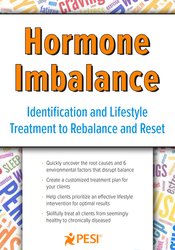

Hormone imbalance – it’s complex and overwhelming.
Clients come to us with symptoms such as extreme fatigue, irritability, anxiety, depression, insomnia, foggy brain, cravings for sugar or salt, constipation, menstrual irregularities, decreased sex drive, and weight gain. These symptoms are common but not normal.
What is driving these symptoms? Can you help them – YES!
Watch Cindi Lockhart, RDN, LD, IFNCP, in this recording as she teaches you how to assess and create a customized step-by-step lifestyle treatment plan that is realistic to follow and get results! She will cover the core hormone systems and how their disruption leads to crippling symptoms and chronic hormone-related conditions. She will share the underlying root causes of hormone disruption and the environmental factors that disrupt their delicate balance. Learn a skill set to address issues such as:
You will be able to guide your clients to manipulate lifestyle factors to re-balance hormones, reduce symptoms, and better manage chronic hormone related conditions.
Don’t miss out on a new functional and integrative approach that gets results!
| File type | File name | Number of pages | |
|---|---|---|---|
| Manual - Hormone Imbalance (2.3 MB) | 127 Pages | Available after Purchase |

Cindi Lockhart, RDN, LD, IFNCP, is board-certified as an integrative and functional nutrition practitioner with over 30 years in professional practice. She has trained nutrition, fitness, and medical practitioners throughout most of her career, yet maintains a personal practice with clients as she believes that the only way she can effectively educate and inspire other practitioners is through her own practical experience with clients. In addition to educating on how Food is Medicine, Cindi also specializes in coaching clients and practitioners on the importance of managing stress, optimizing sleep, proper exercise and movement, and reducing exposure to environmental toxins. Cindi has extensive expertise in women’s health issues including perimenopause/menopause and thyroid dysfunction as well as autoimmunity, gut health, weight management, cardiometabolic health (insulin resistance, diabetes, heart disease), fasting, histamine intolerance, mold detox, and long COVID.
REBALANCE Hormones REDUCE Symptoms
Cortisol
Insulin
Thyroid
Estrogen
Progesterone
Testosterone
Help Clients Prioritize an Effective Lifestyle Intervention
Case Studies related to Estrogen Dominance, Andropause, & Hypothyroid
Please wait ...